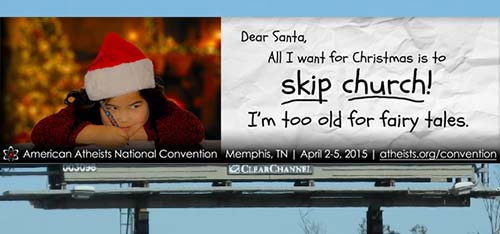Anti-theists (also known as hatetheists) are at it again. This time it’s a billboard (image above) that assumes Santa is real but Christmas is just a fairy tale.
The billboards are located in Memphis, Nashville, St. Louis, Fort Smith (Arkansas), and Milwaukee.
Let me (once again) stress – I have excellent relationships with atheist and agnostic friends and acquaintances. I have no emotional need to clone my beliefs and opinions, and to change their beliefs. They generally are the same in relation to me. [The same can be said for my relationships with people of other faiths].
And, as I have said previously, some of the most delightful people are atheists, or honest agnostics, generous, living each day as fully as possible, trying to help others have a good time (this being the only life they are sure of), caring for the planet (it being all we’ve got), humble, funny, with no bait-and-switch motivation for friendship.
But, just as there are fundamentalist Christians, there are fundamentalist atheists, obsessed with getting others to believe what they believe, and with a passion that leads to the irrationality of having a girl writing to Santa Claus that she is too old for fairy tales! That an atheist is concerned about how to celebrate Christmas appears about as reasonable as a Buddhist being concerned how they should celebrate Hanukkah.
We need to reflect on the actual and positive place of fairy tales. Fairy tales have a very significant role in being fully human. Fairy tales convey truth in a way that other genres do not. The belittling of fairy tales leads to the stunting of the human spirit. The censoring of imagination, the forbidding of fiction, and the disparaging of metaphor, allowing only the most black-and-white literalism, not only destroys what makes us human, but is the termination of serious academic science as we know it.
Then there is the put down of children, an ageism that sees being adult as somehow of greater merit or value than that of being a child. Children, of the age of the atheist billboard child or older, are goaded that they are “too old for fairy tales”. This is the very opposite of the spiritual tradition that values children, and encourages us all, whatever our age, to treasure our inner child – to live with child-like imagination, awe, and wonder.
And not to forget the obvious targeting of children in this billboard. The antitheist meme of Christians indoctrinating children is a viewing of normal human development through lenses made more explicit in this image.
Just as fundamentalist Christians, and fundamentalists of other religions, give Christians and people of other faiths a bad name, so antitheists and hatetheists are an embarrassment to most atheists and agnostics.
*****
Here are last year’s Times Square billboards:






The atheists make it sound like Christianity is compulsory which is pretty childish. Its encouraging that Christ remains the big target. I suspect that is because its the only target that matters in a debate like this. Other faiths are interesting and sometimes “cool” for puffed up westerners seeking something that is self indulgent but they are all dead ends.
And what do your atheist and agnostic friends think of folks like Richard Dawkins and Christopher Hitchens? Sometimes it looks like the antitheists are the majority in the secular community.
I guess, Carlos, that’s like sometimes it looks like the fundamentalists are the majority in the Christian community. Blessings.
I hold fast to some aspects of the Christian faith – what I would see as the “not negotiables” but don’t consider myself a fundie.
Therefore I’m curious as to what you mean by “fundamentalist” Bosco and would be grateful if you could set out some key points that would, especially given your theological training, see someone stuck in that camp.
Thanks in anticipation.
Thanks, Brown. As you “don’t consider yourself a fundie” – it may help if you describe what you see a “fundie” (your term not mine) is, that you are clear you are not. Advent blessings.
I asked what you saw as meant by the term fundamentalist so did use your term.
In any case I think the term “fundamentalist” is an unfortunate one. The reason I asked is because I believe the term has come to mean those who hold to what some would see as the basic Christian fundamentals like virgin birth, Christ’s death, resurrection and ascension, miracles that even today we could not explain, the rejection of Christ being fatal, the in-dwelling Holy Spirit and so on. The Nicean Creed comes to mind as a “fundamental” Christian document.
This system of belief is projected onto a world view and impacts the perceptions on social issues. It may see stands taken against issues like gay marriage, prostitution, endorsement of other religions but such contrary views, if held, are not limited to Christians.
My perception is that the term “fundamentalist” is a label (and labels are often unfortunate) targeted at those Christians who struggle to reconcile science and religion as much as at those who attempt to fly in the face of supposedly popular social changes they perceive as willfully sinful.
I would draw a distinction between “fundamentalists” and, say, literalists that won’t explore the possibility of seeing the bible speaking in many different styles of prose and arguably get the wrong end of the stick in doing so.
I’m not sure this really helps but don’t have the trained theological basis that you do hence my question. When a secular person uses such a term there mat well be ignorance behind it but with your training I would expect there to be some detail as to what the characteristics of a fundamentalist are. Maybe I am one!
Regards.
I thought I responded before going to church today but appear to have stuffed up as I am prone to do with IT of any sort. In any case I asked what a “fundamentalist” was in your view given your training so did use your term.
In any case, my view is firstly that its a label generally thrown about by the secular who cannot or do not see things from a “Christian” perspective. They will generally not know what Christian fundamentals are so may not be qualified to have an opinion that need be taken seriously but its a free world and genuine debate is useful.
Secondly its used, again generally by the secular, to describe Christians opposing the latest social issue (such as gay marriage) on the basis they are out of touch with reality as some would like it to be because they hold to a conservative as opposed to liberal religious view.
Lastly it seems to be applied to people who discount science because they see the Bible as making scientific claims that make modern science foolish when they perceive a conflict arises. Again its a claim I see from the secular whereas, as a Christian, I’d look to apply a literalist label perhaps rather than a “fundamentalist” one.
I don’t think I fit in the above categories so don’t see myself as a fundamentalist in the way that my secular friends use the term.
If my holding to the view that something like the Nicean Creed is an outline of the Christian basics and should be accepted as the fundamentals I would class myself as a fundamentalist because I believe in what I see as the Christian fundamentals. If, for example, you take away the sin of man and the redeeming divinity of Christ with his death, resurrection and ascension you are left with nothing special to separate Christianity from other religions. I would argue that the person holding that castrated position is not embracing Christianity at all.
When a learned ordained minister such as yourself uses the label “fundamentalist” I would expect it to relate to a more theological, as opposed to social, position and simply wondered what theological features would apply.
Cheers.
Thanks, Brown, for pulling me up on this.
As I’m sure you well know, I think we need to be very, very careful when we use labels (“evangelical”, “conservative”, etc.) In the context of my post I was simply trying to show how certain atheists, in the belligerence of their approach, mirror the very aggressive, unreasonable Christians whom they are attacking. I was further underscoring that many/most atheists I know are not like this, just as many/most Christians I know are not like the stereotype that they are berating.
Due to time pressures in a very busy life, I may have been less precise than was helpful for you. I certainly think that using “fundamentalist” as referring to those who adhere to the Nicene Creed makes the word pretty useless. I notice that recently the Pope has referred to issues with “fundamentalists” (and I’m sure that he adheres to the Nicene Creed).
Just for a quick definition that may help:
Advent blessings.
Thanks Bosco and I’m sorry to have responded twice – the first response didn’t appear so I thought I’d not passed go. Its funny how a day’s pondering changes how you say something despite the intention being the same.
Best wishes.
‘The atheists make it sound like Christianity is compulsory which is pretty childish’
not in the US.
Interestingly I have lived in Fort Smith Arkansas briefly, one of the most ‘Christian fundamentalist’ places on earth! So quite a provocative place to put up an atheist billboard.